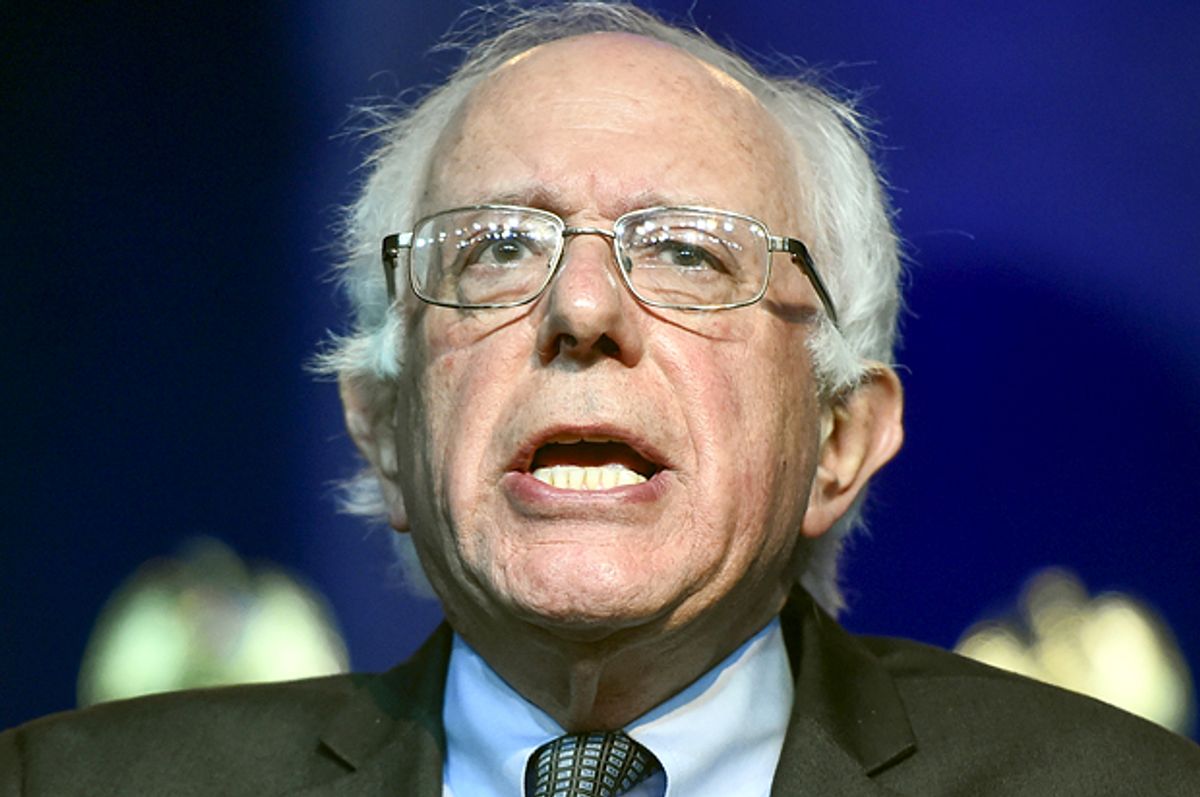 Bernie Sanders is leading Hillary Clinton in early primary states, and he's gaining on her in national polls. Major media outlets are starting to treat Senator Sanders seriously, but not necessarily with complete honesty. Take for example Laura Meckler's article in the Wall Street Journal earlier this week. It was provocatively titled "Price Tag of Bernie Sanders's Proposals: $18 Trillion."
Bernie Sanders is leading Hillary Clinton in early primary states, and he's gaining on her in national polls. Major media outlets are starting to treat Senator Sanders seriously, but not necessarily with complete honesty. Take for example Laura Meckler's article in the Wall Street Journal earlier this week. It was provocatively titled "Price Tag of Bernie Sanders's Proposals: $18 Trillion."
The article starts off by dismissing Sanders's campaign as a long-shot, and then goes on to call his proposals "the largest peacetime expansion of government in modern American history."
"In all" Meckler writes, "he backs at least $18 trillion in new spending over a decade... a sum that alarms conservatives and gives even many Democrats pause."
That estimate may give conservatives and corporate Democrats pause, but the whole article should give any reader who can do simple arithmetic pause. One red flag is that the click-bait headline makes it seem like the piece is talking about a one- or maybe two-term estimate of what Bernie's budgets might look like. Or even more extreme; that just getting his proposals off the ground would take $18 trillion.
But the reality is that we're only looking at $1.8 trillion a year under Bernie's sweeping proposals. But that's just a little editorial sleight of hand to drive traffic to their site right? Well, not quite.
You see, the Wall Street Journal piece cited research by Gerald Friedman, a professor of economics at the University of Massachusetts at Amherst. And there was just one small problem with their interpretation of his research. They blatantly omitted his conclusion.
But in the age of information, major newspapers are rightfully under more scrutiny than ever. Professor Friedman saw the Wall Street Journal's piece and responded in the Huffington Post with "An Open Letter to the Wall Street Journal on Its Bernie Sanders Hit Piece."
He writes that the Journal wasn't completely wrong: the program would involve spending $15 trillion over a decade. But they left out the key detail: it would actually save the country a total $5 trillion over those 10 years. We'd see those savings in reduced administrative waste, lower pharmaceutical and device prices, and by decreasing the rate of medical inflation.
Because the simple fact is: We, as a people, are going to spend that $15 trillion on health care anyway. The difference is that under the current model, we pay that money to private insurance companies. And those private companies have much higher levels of administrative costs, fraud and general waste than Medicare does. Another difference is that the government would be negotiating drug prices, making drugs more affordable for everyone.
And who would see that $5 trillion in savings? Businesses for one. Along with state and local governments. Because they wouldn't have to pay for their employees' insurance — who'd be covered by Medicare for All.
And individuals, like you and me, wouldn't have to worry about co-payments and deductibles. Or worse, finding that the "affordable plan" that we choose doesn't cover a necessary procedure.
You see, as Bruh1 points out over at DailyKos, the Wall Street Journal presented government spending in a fundamentally dishonest way. Because what we spend can't be separated from what we'd save by going with different policies.
Take Bruh1's example of shopping for a car: "You don't buy a car by saying 'well it would cost me 10,000 here, but the same car would cost me 7,000 there, so the price tag on the 10,000 car is too expensive.' You say 'it saves me 3,000 to buy from the other guy."
And that's the point — it's not $15 trillion that Bernie's plan would cost the country, because we as a people will spend that amount, and more, on health-care costs anyway.
It's $5 trillion that we the people will save with Bernie's plan — and get back — by adopting an efficient and affordable single-payer health-care for all system. And that would be good for everyone, and the economy as a whole.
Unfortunately the Wall Street Journal's analysis of Bernie's proposals isn't just another routine example of shoddy corporate journalism. It's an example of how the corporate media tries to discredit and discard anyone who they can't control. And that's not just bad news for our political process. It's also bad news for the Fourth Estate, which really should at least try to be honest in its critique of policy issues.


Shares